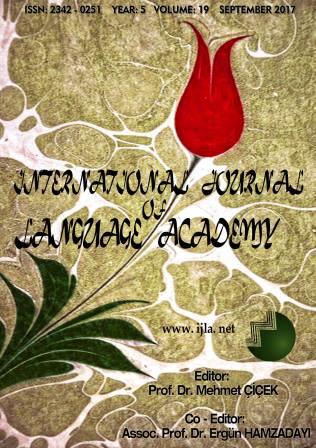Author :
Abstract
Dildeki birliklerin oluşma ve gerçekleşme aşamalarına göre konumunu belirleyen, başlangıç noktasındaki giren bilgi “primery data” den sonuç noktasındaki çıkan bilgi “secondery data”ye kadar olan süreçte gelişimini gösteren; kesinlik ve doğruluğunu sağlayan, tanıtlayan ve teyit eden durumu dil birliklerinin “anlamlı basamak”ı (significant digits) olarak adlandırılır. Dil birlikleri için “Anlamlı basamak, “üstel gösterim” (exponential notation)in olduğu ve dilbilgisel çözümlemenin başladığı ilk basamaktır. Dilin işleyişinde belli bir düzen olduğu ve dilin yapısı ve sistematiği belirli kurallara bağlı bulunduğu için dildeki somutlaştırma ve kavramlaştırma dil birliklerinin “doğru kullanım”larına uygun anlamlı basamaklarında gerçekleşir. Dilbilgisel gösterimde dil birliklerinin gelişimi ile ilgili herhangi bir safha atlanır, dil birlikleri veya birliklerinin bir parçası (segmenti) kendi “anlamlı basamak”ında kullanıl(a)maz ya da dizim ve dizi içinde yanlış grup ve öbekte kullanılırsa, ait olduğu dil birliğinin anlamlı basamak yitimi: “significance loss” ne sebep olur. Mantığa dayalı statik dil ile anlatış psikolojisini ilgilendiren dinamik dil arasındaki ayrımın tam ve doğru yapılmadığı ve en küçük biçimbirimden başlayarak bütün biçimbirimlerin kendi “anlamlı basamak”larında kullanılmadığı; adlandırma ve anlamlandırmaların kendi “anlamlı basamak”larında yapılmadığı durumlarda ekin, kelimenin, öbeğin “dil birliğinin” dilde oynadığı rol, taşıdığı görev ve içerdiği anlam ile ilgili kavram ve kavramlaştırma yanlışları ortaya çıkar. Öğretimlik grameri ve öğrenme psikolojisini ilgilendiren ve cümleden eke kadar her türlü dil birliğinde yapılan bu kabil yanlışlar, dil öğreniminin ve öğretiminin önemli sorunlarını oluşturur.
Keywords
Abstract
The input data at the initial point, which define the position of units in language according to their formation and realization stages, the output data at the end-point of the “primary data”, the status that ensures, demonstrates, and confirms the accuracy and precision until the “secondary data” are called as the “significant digits” of the language units. For language units, the “significant digit” is the first digit where there is the exponential notation and where grammatical analysis starts. Since there is a certain order in the functioning of the language, and since the structure and systematic of a language are based on certain rules, the concretization and conceptualization in language occurs in significant digits that are suitable for the “accurate usage” of language units. In linguistic notation, if any of the digits is passed with the development of language units; if the whole or a segment of language units cannot be used is not used in its “significant digit”; or used in a wrong group or class within the composition and series; this situation causes the loss of the significant digit in the language unit it belongs: “significance loss” occurs in this way. In situations where the distinction between the statically language based on logic and the dynamic language that is related with narration psychology is not made in a clear and accurate manner; and when all the morphemes starting from the smallest ones are not used in their own “significant digit”; and in case the denomination and interpretation are not made in their own “significant digits”; misconceptions will emerge about the task of the language units and about the functions of the role of “affix, word, phrase” in the language. Such misconceptions that are the subject matter of grammar and learning psychology and that are observed in all language units from the sentence to affixes constitute the most important problems of the language learning and teaching.





